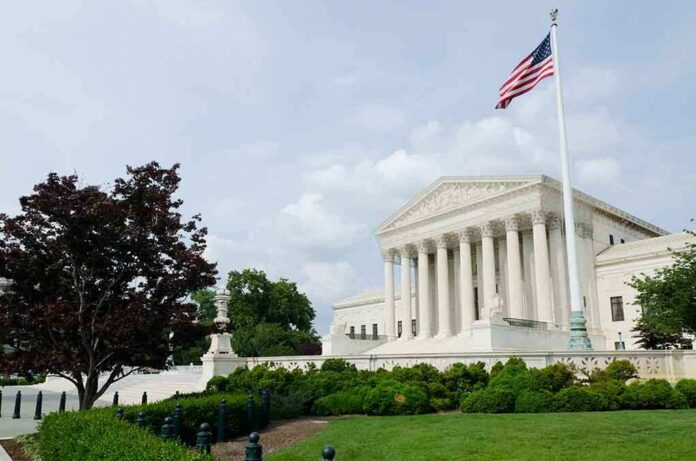
The Supreme Court has reinstated President Trump’s policy requiring all new U.S. passports to reflect the holder’s sex assigned at birth, marking a decisive victory for traditional values and executive authority.
Story Highlights
- Supreme Court revives Trump-era passport rule, requiring sex assigned at birth on new passports.
- Lower court injunctions blocking the policy are overturned, restoring executive power.
- Transgender individuals face new legal uncertainty and potential revocation of previously updated passports.
- Conservative majority cites precedent and administrative law, rejecting claims of discrimination.
- Policy aligns with broader efforts to uphold biological reality and protect national standards.
Supreme Court Reaffirms Executive Authority
The U.S. Supreme Court, in a shadow docket ruling, has reinstated President Trump’s policy mandating that all new passports reflect the holder’s sex assigned at birth. The unsigned majority opinion dismissed claims of discrimination, asserting that displaying historical facts does not constitute differential treatment under equal protection principles. This decision overturns lower court injunctions that had blocked the policy, restoring the executive branch’s ability to enforce administrative standards without judicial interference. The ruling signals a clear judicial deference to executive authority, reinforcing the administration’s commitment to upholding traditional definitions of sex and protecting the integrity of government documents.
The Court’s decision is rooted in precedent, including Trump v. Hawaii (2018), which established that factual accuracy in government records does not inherently violate constitutional protections. The majority rejected arguments that the policy was motivated by animus or arbitrary action, emphasizing that the State Department’s approach is consistent with long-standing administrative practice. This outcome reflects a broader trend of the judiciary respecting executive discretion in matters of national documentation and identity, especially when such policies are grounded in biological reality and public safety.
Impact on Transgender Passport Holders
Transgender individuals who previously updated their passports now face legal uncertainty, as the administration considers whether to revoke documents issued under the interim policy. The ruling leaves those with recently updated passports in limbo, potentially exposing them to increased scrutiny at borders and heightened risks of discrimination or harassment. The State Department has not issued an official statement, but internal sources indicate an ongoing review of passport validity. Advocacy groups have condemned the decision, warning of immediate and concrete harm to vulnerable populations, while legal challenges are expected to continue in the lower courts.
The policy’s revival underscores the administration’s focus on restoring clarity and consistency to federal documentation, rejecting what many conservatives view as the “woke” agenda that prioritizes subjective identity over objective facts. The administration’s actions align with its broader agenda to protect children, uphold family values, and ensure that government policies reflect the will of the American people rather than activist judicial rulings.
Broader Implications for Administrative Law
The Supreme Court’s use of the shadow docket to fast-track this reversal highlights a growing trend of judicial deference to executive authority, particularly in cases involving administrative law and national standards. The ruling sets a precedent for future executive actions targeting marginalized groups, potentially encouraging similar policies in other areas. The decision also raises concerns about the erosion of rights for transgender individuals and the broader implications for administrative power and judicial review. As the administration continues to implement its agenda, the balance between executive authority and individual rights remains a central issue in American governance.
SCOTUS Revives Trump's Transgender Passport Rule https://t.co/ZUxTtpatAS Good. Stop this woke BS.
— Keith Holcomb (@frreo54) November 7, 2025
The Supreme Court’s decision is a significant victory for President Trump and his administration, reinforcing their commitment to traditional values and executive authority. The policy’s revival reflects a broader effort to uphold biological reality, protect national standards, and ensure that government policies serve the interests of the American people. As the administration moves forward, the impact of this ruling on transgender rights and administrative law will continue to be closely watched by both supporters and critics.
Sources:
Erin In The Morning: SCOTUS Rules Against Trans People’s Passport Rights
Supreme Court Opinion: Trump v. Orr












